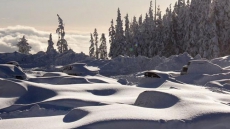RCMP and ICBC are urging drivers to prepare in the lead-up to the winter driving season, during which statistics show there is a dramatic increase in crashes.
According to ICBC, casualty crashes (where at least one person was injured or killed) due to driving too fast for conditions increase by a staggering 87% across B.C. in December compared to October. Read ICBC's press release here.
With the expectation of heavy rains and increased snow as we approach December, North Vancouver RCMP and ICBC are urging drivers to ready themselves as they head out on BC roads.
"We have three ski hills on the North Shore alone," said Sgt. Peter DeVries, of the North Vancouver RCMP. "Add in the Sea to Sky corridor, with Whistler and other snow sports destinations such as Squamish and Pemberton, and it's easy to see why we're out here reminding people to change their driving habits as winter conditions start to change our roads."
"The most important advice we can give is: 1) Slow down; 2) Increase your following distance; 3) Slow down; 4) Slow down, and lastly, 5) Slow down," said DeVries. Other Safe driving tips include preparing your vehicle and changing your driving habits:

VEHICLE CONDITION
TIRES
are they snow rated
what's the condition of the tread
are they properly inflated
LIGHTS
are all your lights working - front and rear
are they cleared of any snow or ice
WINDOWS
are they cleared of snow and ice BEFORE you head out
are your windshield wipers in good condition
is your washer fluid filled with a de-icing liquid
is your defroster working properly
DRIVING BEHAVIOUR
SNOW
decrease speed
increase distance
don't pass any snow plows
consider transit or taxi
FREEZING RAIN
ice on your windshield = ice on the road
black ice common areas: bridges, overpasses, shady areas, intersections
SAFETY PRECAUTIONS
EMERGENCY KITS
Anyone heading out on longer trips should prepare an emergency kit containing:
Windshield scraper and snow brush
Extra windshield washer fluid
Flares or matches and lighter, candles
First aid kit
Shovel and traction mat, sand or kitty litter (non-clumping)
Flashlight and extra batteries
Battery jumper cables
Extra clothing and footwear including jacket, gloves, toque, scarf
Blanket or sleeping bag
High-energy food (protein bars, etc.) and water
Tow rope
Cellphone charger
TIRE SPECIFICATIONS
A few points about tires:
The right tires for you depend mainly on when, where and what type of vehicle you drive. If you’re unsure of which tires are right for you, or the condition they’re in, talk to your local tire dealer so you get the tires best suited for your needs.
Check for wear before installing previously used tires.
Keeping your tires properly inflated is the single most important part of tire care. A tire that is improperly inflated is prone to irregular wear, reduced tread life, poor handling and traction loss. Refer to the recommended inflation level in your vehicle’s owner’s manual.
In B.C., winter tires are defined as those labelled with either the Mountain Snowflake symbol or the Mud and Snow (M+S) symbol. Winter tires must be in good condition with a minimum tread depth of 3.5 mm, and must be used on designated highways from October 1 to March 31.
If you live or travel in an area where you would normally and regularly expect snow, ice and slush, we recommend using four matched winter tires that carry the mountain/snowflake symbol. Mountain/snowflake tires offer a higher level of traction in harsh winter conditions.
M+S tires are a viable and safe option with minimum tread depth for drivers who plan their trips to coincide with periods of better weather, and are prepared to drive with added care and caution if they encounter winter conditions.
Large trucks must carry chains. Although not required for regular passenger vehicles, it’s a good idea to also carry chains if you often drive in severe winter weather conditions. Police officers may turn vehicles around if they feel that winter tires alone are unsafe for the conditions.
Winter tires are not mandatory across B.C. – mainly because our climates range from freezing cold to pleasantly mild in the winter
